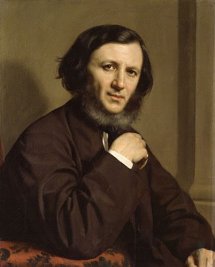
Robert Browning spent seven years composing Sordello, a 40,000-word narrative poem about strife between Guelphs and Ghibellines in 13th-century Italy. It was not received well.
Tennyson said, “There were only two lines in it that I understood, and they were both lies: ‘Who will may hear Sordello’s story told’ and ‘Who would has heard Sordello’s story told.'”
Thomas Carlyle wrote, “My wife has read through ‘Sordello’ without being able to make out whether ‘Sordello’ was a man, or a city, or a book.”
Douglas Jerrold opened the book while convalescing from an illness and began to fear that his mind had been destroyed. “O God, I AM an idiot!” he cried, sinking back onto the sofa. He pressed the book on his wife and sister; when Mrs. Jerrold said, “I don’t understand what this man means; it is gibberish,” her husband exclaimed, “Thank God, I am NOT an idiot!”
In Walter Besant’s 1895 novel The Golden Butterfly, one character spends eight hours trying to penetrate Browning’s poetry. “His eyes were bloodshot, his hair was pushed in disorder about his head, his cheeks were flushed, his hands were trembling, the nerves in his face were twitching. He looked about him wildly, and tried to collect his faculties. Then he arose, and solemnly cursed Robert Browning. He cursed him eating, drinking, and sleeping. And then he took all his volumes, and disposing them carefully in the fireplace, set light to them. ‘I wish,’ he said, ‘that I could put the poet there too.'”
Another (apocryphal) story tells of a puzzled friend who asked Browning the meaning of one of his poems. “When I wrote it, only God and I knew,” the poet replied. “Now, God alone knows!”
